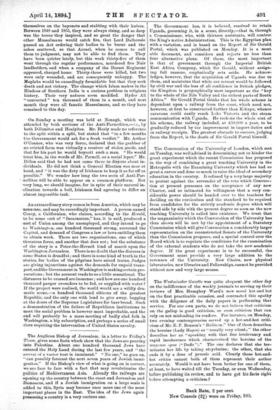The Government has, it is believed, resolved to retain Uganda,
governing it, in a sense, directly,—that is, through a Commissioner, who, with thirteen assistants, will control the King's native Administration. This is the Egyptian plan with a variation, and is based on the Report of Sir Gerald Portal, which was published on Monday. It is a most able document, and considers and rejects no less than four alternative plans. Of these, the most important is that of government through the Imperial British East Africa Company, which Sir Gerald, without assign- ing full reasons, emphatically sets aside. He acknow- ledges, however, that the acquisition of Uganda was due to them, and maintains that while our retreat would be followed by civil war and the loss of all confidence in British pledges, the Kingdom is geographically most important as the "key to the whole of the Nile Valley and the richest parts of South Africa." Sir Gerald Portal thinks that his whole scheme is dependent upon a railway from the coast, which need not, however, at first be constructed further than Kikuyu, whence caravans could easily reach Lake Victoria and the steam communication with Uganda. He reckons the whole cost of his scheme, the railway included, at £50,000 a year, to be gradually reduced by the improvement in import-duties and in railway receipts. The greatest obstacle to success, judging from the Report, is the death of Sir Gerald Portal himself.


































 Previous page
Previous page